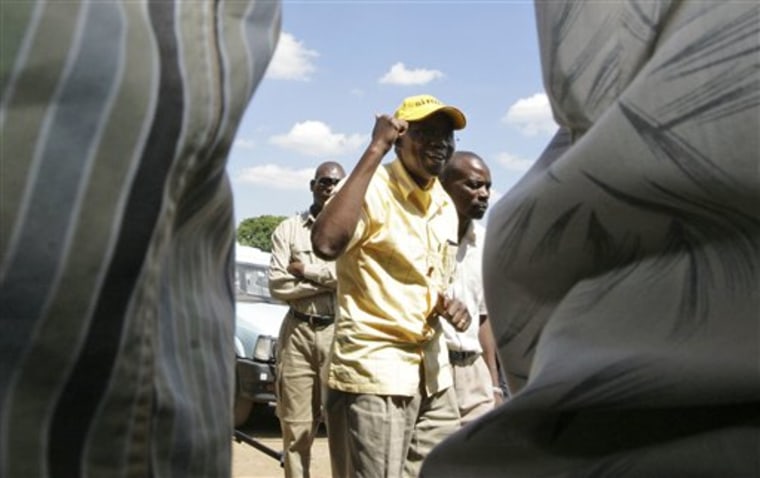The military patrolled the capital in armored personnel carriers Friday, a day after the opposition accused President Robert Mugabe of plotting to rig Saturday's elections.
The chiefs of police, army, air force, prison service and the intelligence agency told reporters that the armed forces were "up to the task in thwarting all threats to national security."
Many see the election as the strongest challenge yet to Mugabe, in power since Zimbabwe won independence from Britain in 1980. He faces both opposition leader Morgan Tsvangirai, 55, and former ruling party loyalist and finance minister Simba Makoni, 58.
In their first joint statement, Tsvangirai and Makoni said Thursday that their separate scrutiny of voters' lists showed severe discrepancies that open the way for fraud.
Tsvangirai urged voters at a rally Thursday to remain at polling stations after they voted to protect their votes, and he urged public servants not to help with fraud.
"Mugabe cannot rig elections by himself," Tsvangirai said. "If someone tells you to falsify the results of the elections, ignore the instructions, because it is unlawful. Don't be used to do something shameful."
Charges of stealing
Opposition officials said they had yet to receive full nationwide voters' lists. But they had enough problems to indicate "a very well thought out and sophisticated plan to steal the election from us," Makoni said at a news conference Thursday called jointly by the main groups opposing Mugabe.
Among those still on the voter lists are Ian Smith — the last white prime minister of Rhodesia, as Zimbabwe was known before independence in 1980, who died last year in South Africa — as well as his former law and order minister Desmond Lardner-Burke, who died nearly 30 years ago.
Also listed are the first two opposition activists assassinated during the 2000 election campaign, and two white farmers killed during government-sanctioned seizures of white-owned farmland.
And in one northern Harare district called Hatcliffe, thousands of voters were registered as living at addresses that turned out to be vacant lots, the opposition said. Photographs of the lots were shown to reporters, foreign diplomats and regional African election observers.
Mugabe denied the charges, saying on state television: "They want to tell lies, lies."
International observers barred
Zimbabwe has barred international observers from the United States and the European Union from Saturday's vote. Several international media organizations also have been barred from covering the elections.
Mugabe is accused of trying to buy votes by handing out tractors, generators and state-subsidized food in the country suffering an economic meltdown with inflation of more than 100,000 percent.
The agriculture-based economy was disrupted when Mugabe launched his agrarian reforms in 2000, forcefully taking fertile land from the country's white minority for distribution to the country's black majority.
On Thursday, the president handed 510 cars to doctors at Harare's main hospital, part of a project to halt the exodus of skilled Zimbabweans.
Arthur Mutambara, head of a breakaway faction of the Movement for Democratic Change, told Thursday's news conference that Mugabe's opponents set aside their political differences to challenge election organizers and regional observers to stop vote rigging which he said could spur "dire consequences" that might include violent revolt.
The security service chiefs, meanwhile, said "those who have been breathing fire about Kenya-style violence should be warned." More than 1,000 people were killed in the violence after a disputed presidential election in December.
